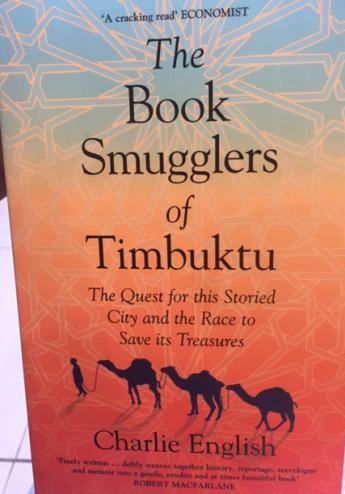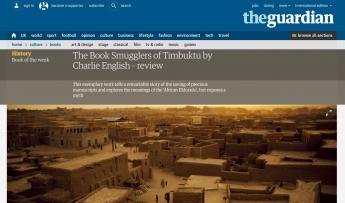Book Review - The Book Smugglers of Timbuktu by Charlie English

For the bibliophile, Timbuktu is synonymous with the legendary city in the African desert and its legacy of hundreds of thousands of ancient manuscripts.
The West African city of Timbuktu, in Mali, was established in the 12th century by the Tuareg and gained prominence as a cultural and intellectual centre in the 15th century.
The city was based at an important crossroad between the Sahara desert and the fertile central valley of the river Niger. It began as a settlement of merchants, who were followed later by Muslim scholars. Historians see the 15th and 16th centuries as Timbuktu’s “Golden era”, though Timbuktu remained an inspirational centre
of scholarship up to the early 20th century.
In 1897 Timbuktu was conquered and then ruled by the French until Mali became an independent nation in 1960. Between 1968 and 1991, Mali suffered under the dictatorship of Musa Traore ending this era in 1992 with their first democratic elections.
From 1970, UNESCO became involved in an initiative to establish a regional manuscript repository for West Africa and the Ahmed Baba Institute (IHERI-AB, then CEDRAB) was opened in 1973 as a public state manuscript library and research institution in the centre of Timbuktu.
The Institute started to prospect and collect manuscripts from the whole country, as well as to partly digitise and catalogue about 9,000 mss. A new building was commissioned and finished in 2009, as part of a bi-lateral agreement between South Africa and Mali, costing around €5.8m, replacing the forty year old building and designed to house the Institute’s collection of over 40,000 manuscripts.
On January 28, 2013, after 10-months of rebel occupation, as French-led Malian troops entered Timbuktu, fleeing Tuareg Islamists sacked parts of the new Ahmed Baba Institute building which they had been using as sleeping quarters, leaving behind a pile of seemingly burnt manuscripts, resulting in an international outcry in the media. However, before and during the occupation, a reported 300,000 Timbuktu manuscripts from the Institute and from private libraries were saved and moved to more secure locations and most of them are still held to date in Mali’s capital Bamako.
British publisher William Collings has just released "The Book Smugglers of Timbuktu" by well-known journalist Charlie English, describing the unprecedented race to save the manuscripts and giving valuable insights into Timbuktu's rich cultural history.
"...Fascinated by the history of the town and the attempts by 18th and 19th-century western explorers to reach what they imagined to be an African Eldorado, glinting with gilded domes and a place that could make their fortunes and immortalise their names, he decided to interweave the story of the al-Qaida occupation, and the efforts to save the city’s literary heritage, with accounts of early attempts to reach and understand Timbuktu, and the role that dreams, imagination and myth-making all played in the process. ...
There is no doubt that al-Qaida did represent a threat to the Timbuktu libraries, and indeed around 4,200 manuscripts were burned by the jihadists as they were leaving town – just as Isis last month destroyed the great mosque of Mosul during its retreat. Equally, there is no doubt that the librarians went to heroic lengths to protect the treasures under their guardianship, burying some and smuggling out others. But as his research progressed, he became increasingly suspicious that the scale of the rescue operation had been exaggerated by the heroes of his tale, as they began to understand the extent of the willingness of western donors to wire vast quantities of money to Mali in order to get the precious manuscripts out to safety."
To read the full review, please go here.
The book should bring more clarity about this rescue operation, undoubtedly for a good purpose but probably exaggerated by the press and will be an interesting read for anyone interested in manucsripts and African history.
The International League of Antiquarian Booksellers reported about the rescue operation in 2013 and shared press coverage at the time. Below the links to the articles back in 2013.
A Tragedy: Mali rebels torched library of historic manuscripts
Timbuktu Update - Timbuktu Manuscripts Project, Huma (Institute for Humanities in Africa) University of Cape Town

